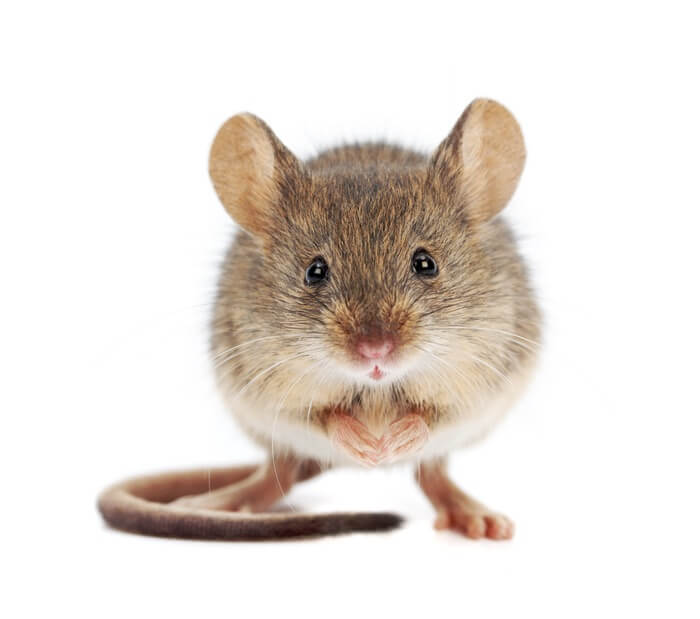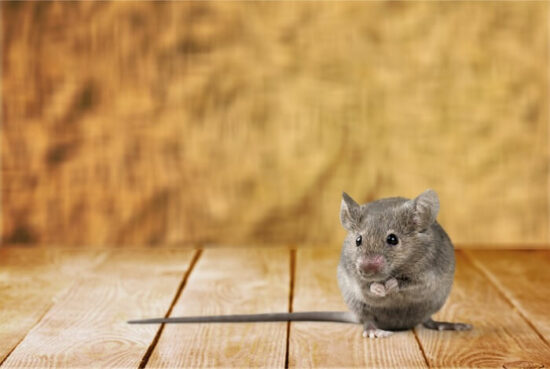Having mice bother you while sleeping is no fun. It’s gross, creepy, and frustrating! But can mice climb or jump into beds without being noticed? And will they bite you?
This guide will answer your questions and teach you how to keep them away.
Table of contents
Can Mice Climb Into Beds?
Those worries of having mice get too close for comfort as you sleep are entirely valid. Mice can climb into beds in the middle of the night.

These rodents are skilled climbers and can also leap surprisingly high. When you consider all of the suitable climbing surfaces nearby (such as overhanging sheets and the furniture itself) there’s plenty of opportunities for mice to get onto your bed.
Signs You Have Mice Near Your Bed
Suspect that you might have mice near your bed? Mice are sneaky creatures that use the cover of night to remain unseen.
However, they do leave behind marks of their presence. Here are some of the telltale signs that you have mice nearby that might climb into your bed.
Droppings
Droppings are one of the most obvious signs that mice are nearby. A single mouse can drop upwards of 100 pieces of poop every single day! They’re small and pellet-like, but the feces quickly accumulates around the areas they frequent.
Quick Tip: Mice don’t choose a specific spot to do their business. That means droppings act like a trail that marks where they have been.
Mouse droppings look a bit like long-grain rice. The individual pieces are about a quarter of an inch long. They’re cylindrical and take on a dark brown or black color. Typically, the ends feature a defined point as well.
If you come across droppings, examine them closely. It’s a good idea to collect a few pieces as well. Make sure to wear protection when you do this.
Poop can tell you a lot about the pest you’re dealing with. Subtle physical differences and the overall size of the droppings could help you determine the mouse species that are in your room. You can take the droppings to a professional exterminator for further guidance.
A Bad Smell
With poop comes awful smells! But it’s not just the droppings that are creating a lingering aroma. In most cases, it’s the urine that’s the problem.
These pests have the same mindset with urination as they do defecation. It doesn’t matter where they are. The rodents do their business when nature calls. That means if you have mice near your bed or in your room, you’ll probably smell them.
Urine produces a strong ammonia smell around your bedroom. It can emanate from the carpet below, around nearby furniture, or even on your sheets directly. Either way, the ammonia smell becomes even more pungent as time goes on.
Mice are filthy creatures all around. In addition to the distinct smell of ammonia, you might notice the general aroma of filth. These pests are notorious for rummaging through garbage and grime, so there’s no telling what kind of awful odors will follow.
Noises
As nocturnal pests, mice do a fantastic job of staying hidden. They’re most active once the sun goes down. Even then, they prefer to remain in the shadows to avoid would-be predators and humans.
Despite their best efforts to go undetected, you can often hear them moving around. If they’re close to your bed, the noise these rodents produce can be downright jarring!
You might hear scratching and rustling as they move behind walls or on hard surfaces. Sounds tend to get amplified as the rodent moves near walls in search of food. The occasional squeak vocalization is pretty standard, too (sometimes they even scream).
A Sighting
You could get a glimpse of the mouse as it navigates your room if you’re in the right spot at the right time. If you see that a mouse has climbed into your bed, there’s a good chance that you’ll cross paths again at some point.
Most bedrooms only have one or two access points. What comes in must come out! So, you’ll likely see it again or notice other signs of its presence until it has a chance to escape.
How To Keep Mice Away From Your Bed
If you’re like most people, the very thought of a mouse climbing into your bed is enough to keep you awake at night. With all the potential health risks of mice infestations, those worries are warranted.
Fortunately, there are many ways to keep mice away from your bed and out of your most relaxing room. Here are a few tactics worth trying out.
1. Clean Up Your Room
First and foremost, give your bedroom a good cleaning.
Mice are highly opportunistic pests. They go where they can find warmth, safety, and food. Your bedroom already checks off most of the requirements. But if you have the added issue of clutter, it’s a haven for these rodents!
Untidiness allows mice to hide and nest. They can scurry around objects to remain unseen. If you leave messes behind long enough, they can even use those items to create dens for reproduction.
Imagine the nightmare that would come with that!
If you want to keep mice away from your bed while you sleep, keeping your room tidy should accomplish this. Instead of tossing clothes on the floor, put them in a hamper and do your laundry! Empty trash bins regularly, take time to fold bed sheets, and stick to a regular vacuuming schedule.
Quick Tip: Make sure to pay attention to every nook and cranny in your room. Spend some extra time on your bed. When the surrounding area is clean, it’s unlikely that mice will climb or jump into your bed and bother you while you sleep.
2. Stop Bringing Food & Water Into Bed
Mice usually don’t crawl on your bed for any old reason. In most cases, it’s because there’s food and water nearby. Your bed happens to offer an easy way to get access to the sustenance they need to survive.
Many of us are guilty of snacking in our beds in the middle of the night. While that might provide a brief moment of comfort, the long-term effects simply aren’t worth it.
It doesn’t take much to attract mice into your bed. Stray crumbs and accidental spills are all they need. Unfortunately, stray food particles can easily get caught in your sheets.
Even if you vacuum afterward, there’s a good chance that you’re not going to get it all.
To keep mice away from your bed, stop the midnight snacking! Keep food and water out of your bedroom entirely.
3. Seal Up The Area
Mice have to get into your room somehow. The easiest way they enter your bedroom is through the door. However, some can also find subtler entry points that help them stay out of sight.
Quick Tip: These rodents are small and agile. As a result, they only need a hole that’s about a quarter of an inch wide to wiggle their way through. For some perspective, that’s about the width of a normal-sized pen!
If you suspect that mice are entering your room and getting near your bed, take some time to perform a thorough inspection. Look for small holes around walls and floors. Usually, mice enter through openings near the bottoms of walls.
There could be a crack near the baseboards or an opening around an outlet. When you find something, seal it up! Use caulk to close the hole and prevent any other mice from getting in.
As for the door, keep it closed at night. For some extra peace of mind, consider using a door sweeper to seal up the small crack at the bottom, too.
4. Unleash Your Cat
Have a feline friend? Let your cat take care of your mouse problem and prevent these critters from getting into your bed and bothering you while you sleep!
Cats are natural-born mice hunters. They have an impeccable sense of sight and smell. Even in the dead of night, cats can easily detect any rodent in the area.
Why not let them sleep in the bedroom with you? Your furry friend will watch over the room and provide that added touch of security. Who knows? You might end up with a dead mouse and a proud cat by your bed the following day!
Not all mice will go out of their way to catch mice. Well-fed domesticated felines do not need to hunt for food. So, some may seem a bit indifferent to mice in the area.
That said, many will still hunt for pleasure and sport. It’s an instinctive urge that brings out predatory behavior in many felines.
Quick Tip: Even if your cat seems more aloof to mice, their mere presence can stop mice from getting near you while you sleep. Your kitty’s scent alerts mice that a predator is nearby, so they might flee to stay safe.
5. Place Traps Near Your Bed
If all else fails, you can always set up traps near your bed.
There are tons of commercial traps on the market. These products are relatively low-cost. However, they can swiftly address your rat problem.
The key is to choose a trap that’s safe for your lifestyle. Many products can pose a potential safety risk (however small) to pets and family members.
For example, snap-style traps can incapacitate mice in an instant. However, they can also cause injury to children and pets that are unlucky enough to come across them. The same goes for glue traps.
You’ll want to be extra careful with poisons as well. Rat poison can be hazardous if not used properly.
Quick Tip: Make sure to read the safety instructions and consider worst-case scenarios when planning to use traps.
Will Mice Bother You While Sleeping?
Mice can bother you while you sleep. Whether or not you notice depends on how heavily you sleep!
These rodents can invade your home at any time of the year. However, they’re most prevalent during the colder months. In the winter, they search for a warm haven with plenty of access to food.
If you eat in your bedroom, mice can quickly follow. Mice can be very skittish and shy. But when there’s food in the mix, these rodents can get pretty daring.
They have no problem crawling onto your bed to get access to the food they need to survive. Some will even crawl directly on your body! Generally, that only happens if you’re in a deep sleep and not tossing or turning.
Either way, mice can be a hassle when you’re trying to sleep comfortably. Plus, there are potential health issues to worry about. Addressing your mouse problem before it gets out of hand is paramount.
Do Mice Bite You In Your Sleep?
If you’re worried about bites, you can take a sigh of relief.
While they are perfectly capable of nipping you as you sleep, most mice will not pay any attention to you. Remember, their goal is to get food and get out! They can dart across your body, but most aren’t going to stop and bite you.
The only time that would happen is if you presented an immediate threat. A mouse’s first instinct is to flee. But when they’re unable to do so, some might resort to biting.
Fortunately, that rarely happens. Larger rats are more inclined to bite you as you sleep, but mice would much rather move along undetected.
Will Turning On The Lights Help?
Turning on the lights might have menial effects on the first few days.
Mice are nocturnal and thrive in dark environments. Their senses are fine-tuned to work in pitch black. As a result, bright lights and loud noises tend to throw them off a bit.
If you’re worried about mice climbing onto your bed at night, you can keep the lights on. However, they will only protect you for a few days at most.
These pests are adaptable. They might flee the scene for coverage when you first turn the lights on. But eventually, they’ll get used to the illumination, and everything will be business as usual!
Mice are very determined. No amount of light will stop them from getting to the food crumbs on your bed! Your best bet is to keep your room clean and adopt some of the preventative techniques we discussed earlier.
Conclusion
Mice climbing or jumping into your bed is something that nobody wants. But unfortunately, it’s possible!
Thankfully it’s not hard to keep these critters away while you’re sleeping (and away from your bed in general). As long as you follow the recommendations above, this isn’t a problem you’ll have to worry about.


